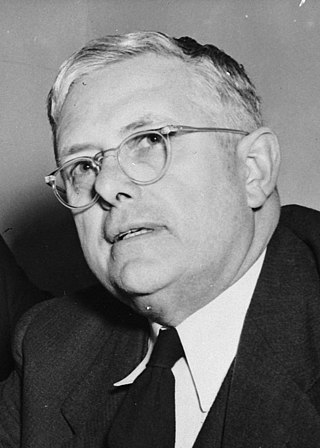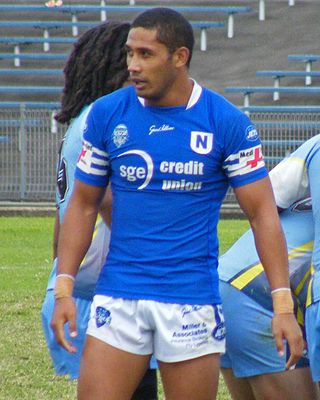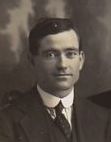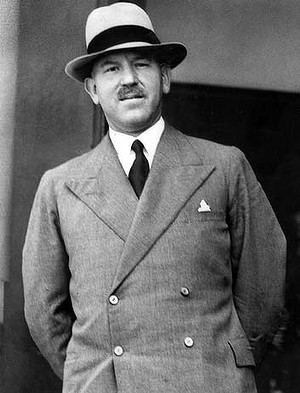Related Research Articles

Thomas Michael Keneally, AO is an Australian novelist, playwright, essayist, and actor. He is best known for his non-fiction novel Schindler's Ark, the story of Oskar Schindler's rescue of Jews during the Holocaust, which won the Booker Prize in 1982. The book would later be adapted into Steven Spielberg's 1993 film Schindler's List, which won seven Academy Awards, including Best Picture.

Western Sydney University, formerly the University of Western Sydney, is an Australian multi-campus public research university in the Greater Western region of Sydney, New South Wales, Australia.

Herbert Vere Evatt, was an Australian politician and judge. He served as a judge of the High Court of Australia from 1930 to 1940, Attorney-General and Minister for External Affairs from 1941 to 1949, and leader of the Australian Labor Party (ALP) and Leader of the Opposition from 1951 to 1960. Evatt is considered one of Australia's most prominent public intellectuals of the twentieth century.

The New Guard was an Australian fascist paramilitary organisation during the Great Depression. It was the largest and most successful fascist organisation in Australian history.

Francis Edward de Groot was a member of the fascist, paramilitary organisation, the New Guard of Australia, who was most famous for intervening on horseback during the official opening of the Sydney Harbour Bridge in 1932, cutting the tape before the Premier of New South Wales, Jack Lang, could do so. Earlier, he had been an antique dealer, and a maker of fine furniture and shop fittings.

Moore Park is a suburb in the Eastern Suburbs of Sydney located 3 kilometres (1.9 mi) from the CBD, in the state of New South Wales, Australia. It is part of local government area of the City of Sydney.
The Australian League of Rights is a far-right and antisemitic political organisation in Australia. It was founded in Adelaide, South Australia, by Eric Butler in 1946, and organised nationally in 1960. It inspired groups like the Canadian League of Rights (1968), the New Zealand League of Rights (1970) and the British League of Rights (1971), with principles based on the economic theory of Social Credit expounded by C. H. Douglas. The League describes itself as upholding the virtues of freedom, with stated values of "loyalty to God, Queen and Country".

Paddington is an upscale Eastern Suburb of Sydney, in the state of New South Wales, Australia. Located 3 kilometres (1.9 mi) east of the Sydney central business district, Paddington lies across two local government areas. The portion south of Oxford Street lies within the City of Sydney, while the portion north of Oxford Street lies within the Municipality of Woollahra. It is often colloquially referred to as "Paddo".

Kangaroo is a 1923 novel by D.H. Lawrence. It is set in Australia.
The People's Advocate and New South Wales Vindicator was a Sydney newspaper published between 1848 and 1856.
Edward George Green, was a pioneer Australian Rugby League player. He is reputed to have been the first Indigenous Australian to play rugby league at first-grade level in Australia.
The Tom Brock Lecture is an annual scholarly lecture organised by the Australian Society for Sports History at the bequest of Australian sports historian Tom Brock. The topic of the lecture is the history of rugby league football. It has been given by leading writers and academics every year since 1999, at the New South Wales Rugby League's headquarters at Phillip Street in the Sydney CBD.
Adam Possamai is a sociologist and novelist born in Belgium and living in Australia. Possamai is professor in sociology and the Deputy Dean in the School of Social Sciences and Psychology at Western Sydney University, New South Wales, Australia. He is the former Director of the Religion and Society Research Centre (RSRC) He is married to Alphia Possamai-Inesedy, and lives in the south-western suburbs of Sydney with his family.

Francis Vaiotu is a New Zealand rugby league footballer for Sydney Roosters in the National Rugby League. His positions of choice is Winger or Centre. He made is NRL Debut in Round 14 2011 against the Melbourne Storm. Francis has a Diploma in Community Welfare from TAFE and a Bachelor of Health Science PDHPE degree from the University of Western Sydney. Vaiotu is a product of rugby league club Cabramatta Two Blues and school Fairfield Patrician Brothers College. He is married to Erin Vaiotu.

James Devereux (1887–1934), also known by the nickname of "Muscles", was a pioneering Australian rugby league footballer who played in the 1900s, 1910s and 1920s. As New South Wales state and Australia national representative three-quarter back, he played in the New South Wales Rugby Football League premiership from its first season in 1908 for the North Sydney club, before playing several seasons in England with Hull FC. He later returned to Australia and coached North Sydney.
Peter Moir (1882-1921) was an Australian rugby footballer of the early 1900s who was a key figure in the foundation of rugby league in Australia. He was one of Australia's first national representative players appearing in the inaugural professional series against New Zealand in 1907 and making the 1908–09 Kangaroo tour of Great Britain. In 1907 he played for New South Wales in the very first rugby match run by the newly created 'New South Wales Rugby Football League' which had just split away from the established New South Wales Rugby Football Union.

Eric Campbell, was an Australian army officer and solicitor who was the leader of the far-right organisation, the New Guard in New South Wales. He created the New Guard as a breakaway organization of the Old Guard. Campbell had grown frustrated with the direction the group was headed in and so he aimed to revive the Old Guard's original ideology within the New Guard. He also aimed to directly oppose Jack Lang's Labour Party in New South Wales and endorsed his fellow Guardsmen to interfere in Lang's public political activities.

The Centre Party, or the Centre Reform Group, and occasionally referred to as the Centre Movement, was a short-lived extreme-right political party that operated in the Australian state of New South Wales. Founded in December 1933, the party's leader and most prominent figure was Eric Campbell, the leader of the paramilitary New Guard movement. That organisation had been established to oppose what its members perceived as the socialist tendencies of Jack Lang, the Premier of New South Wales, but declined following Lang's dismissal in early 1932. The party, unlike most fascist-oriented parties in Europe, acted as a wing of its more prominent paramilitary arm.
Far-right politics in Australia describes authoritarian ideologies, including fascism and White supremacy as they manifest in Australia.
References
- ↑ "Australia soul-searches over violence". New Zealand: Television New Zealand. Reuters. 20 December 2005. Archived from the original on 20 September 2011. Retrieved 19 February 2011.
- ↑ "Profiles". 2021. Westernsydney.Edu.Au. https://www.westernsydney.edu.au/staff_profiles/uws_profiles/associate_professor_andrew_moore.
- ↑ "Sulari Gentill's Paving The New Road". Radio National . Australian Broadcasting Corporation. 19 December 2012. Retrieved 10 August 2013.
- ↑ "Moore, Andrew, 1953-Full Record View- Libraries Australia Search", 2005, https://librariesaustralia.nla.gov.au/search/display?dbid=auth&id=35737545.
- ↑ "Staff Profile: Associate Professor Andrew Moore", 2021, westernsydeny.edu.au, https://www.westernsydney.edu.au/staff_profiles/uws_profiles/associate_professor_andrew_moore.
- ↑ Andrew Moore and John Shields, “Collective Biography and Labour History: The Case of The Biographical Register of the Australian Labour Movement, 1788-1975.” Business and Labour History Group, The University of Sydney, 2009.
- ↑ “Who were the Fascists?” University of Western Sydney Newsletter, December, 2006, research.matters, http://www.uws.edu.au/__data/assets/pdf_file/0003/70968/Research_Matters_Vol_2_Dec_06.pdf
- ↑ "Superintendent Mackay And The Curious Case Of The Vanishing Secret Army", 2021, History Australia, https://www.tandfonline.com/doi/abs/10.2104/ha090072
- ↑ Andrew Moore, and Andy Carr, Centenary Reflections : 100 Years of Rugby League in Australia (Melbourne: Australian Society for Sports History, 2008).
- ↑ Richard Cashman, Tales from Coathanger City: Ten Years of Tom Brock Lectures (Sydney: Australian Society for Sports History and the Tom Brock Bequest Committee, 2010).
- ↑ Cashman, Ten Years of Tom Brock Lectures,4
- ↑ "Moore, Andrew, 1953-Full Record View- Libraries Australia Search", 2005, https://librariesaustralia.nla.gov.au/search/display?dbid=auth&id=35737545.
- ↑ "Staff Profile: Associate Professor Andrew Moore", 2021, westernsydeny.edu.au, https://www.westernsydney.edu.au/staff_profiles/uws_profiles/associate_professor_andrew_moore.
- ↑ “Who were the Fascists?” University of Western Sydney Newsletter, December, 2006, research.matters, http://www.uws.edu.au/__data/assets/pdf_file/0003/70968/Research_Matters_Vol_2_Dec_06.pdf
- ↑ "Federation Press - Author: Andrew Moore", last edited 2021, Federationpress.Com.Au, http://www.federationpress.com.au/bookstore/author.asp?id=784
- ↑ “Labour History- About”, last edited 2021, jstor.org, https://www.jstor.org/journal/labourhistory
- ↑ Andrew Moore, "Phil Cunningham: A Forgotten Irish-Australian Rebel. [This Is the Text of a Presentation Delivered at 'Remembering Vinegar Hill' Seminar, Blacktown City Council, 7 March 2004.]." The Hummer 4 (2004). https://search.informit.org/doi/abs/10.3316/ielapa.200409924.
- ↑ Andrew Moore, Francis de Groot : Irish Fascist Australian Legend (Annandale: Federation Press, 2005).
- ↑ David Ash, "Francis De Groot: Irish Fascist. Australian Legend [Book Review]." Bar News: The Journal of the NSW Bar Association 1 (2006). https://search.informit.org/doi/10.3316/INFORMIT.414204672092817.
- ↑ Tony Nash, "Francis De Groot Irish Fascist Australian Legend" Booktopia, 2005, https://www.booktopia.com.au/francis-de-groot-andrew-moore/book/9781862875739.html.
- ↑ Ash, "Francis de Groot (review)", 85.
- ↑ Geoff Robinson, "Francis de Groot: Irish Fascist Australian Legend [book review]" Labour History, no. 91 (2006): 214-15, Accessed April 23, 2021. doi : 10.2307/27516169
- ↑ Frank O'Shea, "Denizen of a Disturbed Time [Book Review of Moore, Andrew. Francis De Groot: Irish Fascist, Australian Legend (2005).]." Eureka street 16, no. 3 (2006).
- ↑ Geoff Robinson, "Francis De Groot: Irish Fascist, Australian Legend." Labour History. Australian Society for the Study of Labour History, 2006.
- ↑ Michael Cathcart, "Francis De Groot: Irish Fascist, Australian Legend.(Book Review)." The Australian Journal of Politics and History 43, 2006.
- ↑ Cathcart, "Francis de Groot (review)", 494-492.
- ↑ "Sharp End Of History". 2021. Smh.Com.Au. https://www.smh.com.au/national/sharp-end-of-history-20040324-gdilg5.html.
- ↑ Michael Cathcart, “Francis De Groot: Irish Fascist, Australian Legend.(Book Review).” The Australian Journal of Politics and History 43, 2006.
- ↑ Cathcart, “Francis de Groot (review)”, 494-492.
- ↑ Moore, “Labour Historian? Spy?”, 1.
- ↑ Moore, “Writing about the extreme right in Australia”
- ↑ “Labour History- About”, last edited 2021, jstor.org, https://www.jstor.org/journal/labourhistory
- ↑ Moore, “Labour Historian? Spy?”, 1.
- ↑ Andrew Moore, “The ‘Historical Expert’: M.H. Ellis and the Historiography of the Cold War.” Australian historical studies 31, no. 114, 91–109, 2000.
- ↑ Andrew Moore, The Secret Army and the Premier: Conservative Paramilitary Organisations in New South Wales 1930-32 (Kensington, N.S.W: New South Wales University Press, 1989).
- ↑ John McCarthy, “Reviewed Work: The Secret Army and the Premier: Conservative Paramilitary Organisations in New South Wales 1930-32 by Andrew Moore” Labour History, no. 58 (1990), 110-11, Accessed April 24, 2021. doi : 10.2307/27508994
- ↑ Richard Evans, “A menace to this realm : the new guard and the New South Wales police, 1931-32”, History Australia, vol. 5, no. 3 (2008) 76.1-76.20, https://www.tandfonline.com/doi/abs/10.2104/ha080076
- ↑ Andrew Moore, “Superintendent Mackay and the Curious Case of The Vanishing Secret Army: A Response to Richard Evans.” History Australia 6, no. 3 (2009) 72.1–72.18.
- ↑ Andrew Moore, "From the Strand to Boorooloola: M H Ellis as Pioneer Motorist." Journal of Australian studies 28, no. 81 (2004): 83–92. Retrieved from https://search.informit.org/doi/10.3316/INFORMIT.9780980481525
- ↑ Andrew Moore, and Andy Carr, Centenary Reflections : 100 Years of Rugby League in Australia (Melbourne: Australian Society for Sports History, 2008).
- ↑ "Profiles". 2021. Westernsydney.Edu.Au. https://www.westernsydney.edu.au/staff_profiles/uws_profiles/associate_professor_andrew_moore.
- ↑ Charles Little, “The Mighty Bears!: A Social History of North Sydney Rugby League.” Labour History, Australian Society for the Study of Labour History, 1997.
- ↑ Richard Cashman, Tales from Coathanger City: Ten Years of Tom Brock Lectures (Sydney: Australian Society for Sports History and the Tom Brock Bequest Committee, 2010).
- ↑ Charles Little, “The Mighty Bears!: A Social History of North Sydney Rugby League.” Labour History, Australian Society for the Study of Labour History, 1997.
- ↑ Mallory, Greg. “Andrew Moore, ‘The Mighty Bears: A Social History of North Sydney Rugby League’ (Book Review).” The Australian Journal of Politics and History. Brisbane: University of Queensland Press, 1997.
- ↑ Mallory, Greg. “Andrew Moore, ‘The Mighty Bears: A Social History of North Sydney Rugby League’ (Book Review).” The Australian Journal of Politics and History. Brisbane: University of Queensland Press, 1997.
- ↑ Andrew Moore, The Mighty Bears! : a Social History of North Sydney Rugby League, Pan Macmillan Australia, 1996.
- ↑ Andrew Moore, "Opera of the Proletariat: Rugby League, the Labour Movement and Working-Class Culture in New South Wales and Queensland.", Labour History, no. 79, 57-70, 2000.